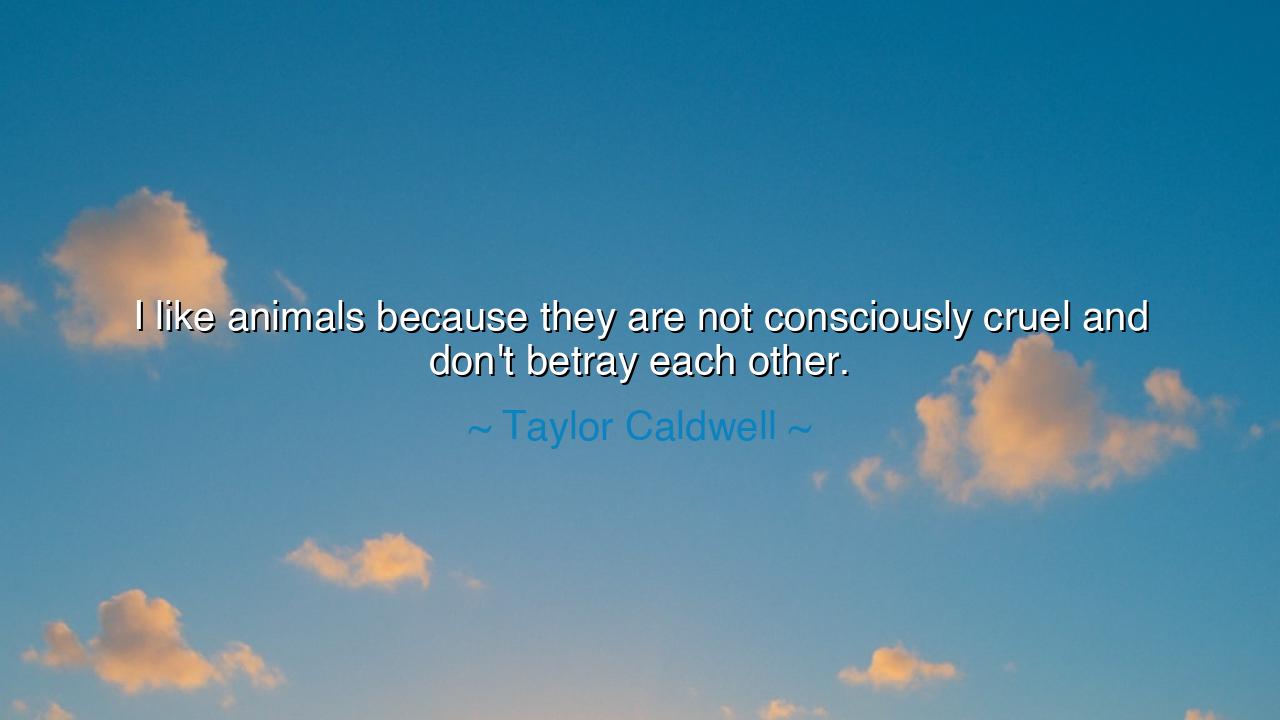
I like animals because they are not consciously cruel and don't






Hear the solemn words of Taylor Caldwell: “I like animals because they are not consciously cruel and don't betray each other.” These words rise like a lament from the heart of one who has witnessed the darker side of humanity. For Caldwell, who lived through wars, upheavals, and the unmasking of human greed, the innocence of animals stood in stark contrast to the treachery of men. She reminds us that cruelty among beasts is instinct, necessity for survival—but cruelty among men is often deliberate, sharpened by pride, envy, and betrayal.
The ancients knew this difference well. In their myths, beasts symbolized raw strength, instinct, and survival, but men were given reason and conscience. With these gifts came not only wisdom but the capacity for corruption. A lion slays not out of malice, but to eat. A serpent strikes not from betrayal, but from fear. Yet man, armed with thought, can wound for the sake of power, deceive for gain, and betray even those closest to him. Caldwell’s words expose this bitter truth: in innocence, animals are purer than men.
Consider the tale of Julius Caesar, betrayed by his own companions. The daggers that struck him were not wielded out of survival, but out of envy and ambition. His fall was not necessity, but treachery. Contrast this with the loyalty of a hound, who, even when beaten or neglected, will often return with wagging tail, offering forgiveness beyond human comprehension. History is filled with men who betrayed one another, but also filled with animals whose fidelity outlasted death.
Caldwell’s words also carry within them a yearning for a simpler world. In the gaze of an animal, one finds no hidden motive, no mask of falsehood. The horse that carries his rider into battle does not plot against him; the dog that guards the home does not whisper slander. Among animals, there may be rivalry, but not treachery; violence, but not malice. To a weary heart burdened by human deceit, this is a sanctuary, a reminder that true loyalty still exists—even if found not in mankind, but in the humble creatures at his side.
Yet her words are not simply an indictment of humanity, but also a call to reflection. If animals, without reason or scripture, live without betrayal, should not mankind—endowed with conscience—rise to an even greater standard? If beasts are innocent by nature, then man must become innocent by choice. The tragedy is not that animals are greater than men, but that men fail to live up to their higher calling. Caldwell’s admiration for animals is also a rebuke: we must learn from them what loyalty and innocence mean.
The lesson for us is clear: let us cast off cruelty and betrayal, for they are not the necessities of survival but the corruptions of the soul. Instead, let us embrace the virtues we see in animals—loyalty, trust, simplicity, and sincerity. Be faithful as the hound, steadfast as the horse, nurturing as the bird to its young. In so doing, we restore to humanity what it was meant to be: not a race of traitors, but a family of souls bound in trust.
So let Caldwell’s words echo as a mirror and a guide: “Animals are not consciously cruel and don’t betray each other.” In them we see the innocence we have lost and the virtues we must reclaim. Let us learn from their example, cherishing loyalty, rejecting malice, and living without betrayal. For if we, who are given reason, can rise to the purity of beasts, then humanity may yet redeem itself and walk in harmony with all creation, no longer as traitors to one another, but as faithful companions in the great household of life.






AAdministratorAdministrator
Welcome, honored guests. Please leave a comment, we will respond soon